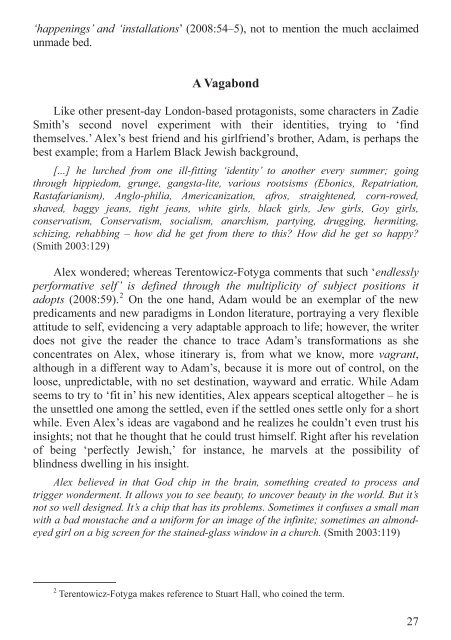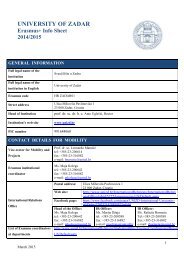keeping all options open: zadie smith's alex-li tandem and ...
keeping all options open: zadie smith's alex-li tandem and ...
keeping all options open: zadie smith's alex-li tandem and ...
You also want an ePaper? Increase the reach of your titles
YUMPU automatically turns print PDFs into web optimized ePapers that Google loves.
‘happenings’ <strong>and</strong> ‘inst<strong>all</strong>ations’ (2008:54–5), not to mention the much acclaimed<br />
unmade bed.<br />
A Vagabond<br />
Like other present-day London-based protagonists, some characters in Zadie<br />
Smith’s second novel experiment with their identities, trying to ‘find<br />
themselves.’ Alex’s best friend <strong>and</strong> his girlfriend’s brother, Adam, is perhaps the<br />
best example; from a Harlem Black Jewish background,<br />
[...] he lurched from one ill-fitting ‘identity’ to another every summer; going<br />
through hippiedom, grunge, gangsta-<strong>li</strong>te, various rootsisms (Ebonics, Repatriation,<br />
Rastafarianism), Anglo-phi<strong>li</strong>a, Americanization, afros, straightened, corn-rowed,<br />
shaved, baggy jeans, tight jeans, white girls, black girls, Jew girls, Goy girls,<br />
conservatism, Conservatism, socia<strong>li</strong>sm, anarchism, partying, drugging, hermiting,<br />
schizing, rehabbing – how did he get from there to this? How did he get so happy?<br />
(Smith 2003:129)<br />
Alex wondered; whereas Terentowicz-Fotyga comments that such ‘endlessly<br />
performative self’ is defined through the multip<strong>li</strong>city of subject positions it<br />
adopts (2008:59). 2 On the one h<strong>and</strong>, Adam would be an exemplar of the new<br />
predicaments <strong>and</strong> new paradigms in London <strong>li</strong>terature, portraying a very flexible<br />
attitude to self, evidencing a very adaptable approach to <strong>li</strong>fe; however, the writer<br />
does not give the reader the chance to trace Adam’s transformations as she<br />
concentrates on Alex, whose itinerary is, from what we know, more vagrant,<br />
although in a different way to Adam’s, because it is more out of control, on the<br />
loose, unpredictable, with no set destination, wayward <strong>and</strong> erratic. While Adam<br />
seems to try to ‘fit in’ his new identities, Alex appears sceptical altogether – he is<br />
the unsettled one among the settled, even if the settled ones settle only for a short<br />
while. Even Alex’s ideas are vagabond <strong>and</strong> he rea<strong>li</strong>zes he couldn’t even trust his<br />
insights; not that he thought that he could trust himself. Right after his revelation<br />
of being ‘perfectly Jewish,’ for instance, he marvels at the possibi<strong>li</strong>ty of<br />
b<strong>li</strong>ndness dwel<strong>li</strong>ng in his insight.<br />
Alex be<strong>li</strong>eved in that God chip in the brain, something created to process <strong>and</strong><br />
trigger wonderment. It <strong>all</strong>ows you to see beauty, to uncover beauty in the world. But it’s<br />
not so well designed. It’s a chip that has its problems. Sometimes it confuses a sm<strong>all</strong> man<br />
with a bad moustache <strong>and</strong> a uniform for an image of the infinite; sometimes an almondeyed<br />
girl on a big screen for the stained-glass window in a church. (Smith 2003:119)<br />
2 Terentowicz-Fotyga makes reference to Stuart H<strong>all</strong>, who coined the term.<br />
27



